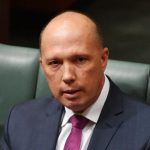Dutton Plans to Set Our International Spy Agency Upon Citizens

Home affairs minister Peter Dutton quietly announced to the ABC a fortnight ago that the Morrison government’s – often denied – push to turn the nation’s international spying agency on its own citizens is close to finalisation.
The minister rolled out one of the usual suspects – child sexual offenders – as a reason for extending spying powers currently used to deal with foreign threats, so they could be applied locally to Australians as well. And he used a disturbing example of a months-old baby being tortured to make his point.
This is the exact same proposal that was exposed by News Corp journalist Annika Smethurst in April 2018, when she reported on leaked documents that revealed senior public servants discussing the Australian Signals Directorate (ASD) being able to access citizen’s emails, bank records and texts.
The documents detailed correspondence between Department of Home Affairs secretary Mike Pezzullo and Defence secretary Greg Moriarty regarding a proposal that would allow ASD agents to hack into critical infrastructure so as to remove threats.
Although, that correspondence doesn’t appear to have been dressed up in fighting paedophile rhetoric.
The AFP went on to raid Ms Smethurst’s home in June last year in relation to the story. And a week after the raids, Dutton appeared on the ABC’s Insiders suggesting that the nation needed to have a “sensible discussion” about providing the ASD with internal spying powers.
And now, the home affairs minister is back spruiking a “public debate” around enhanced domestic surveilling powers – either allowing the ASD to do so or handing the responsibility to the AFP – even though the same article asserts “the proposal is at the advanced stage within the government”.
Blurring the powers
At the time Smethurst broke the news, Civil Liberties Australia CEO Bill Rowlings told Sydney Criminal Lawyers that the division between onshore and offshore surveillance is “to maintain the critical distinction between ordinary policing and defence and spy agencies”.
Currently, the Australian Federal Police and the domestic spying agency ASIO are empowered to investigate citizens after a warrant has been issued by the attorney general, while the ASD has no such powers to operate internally.
Rowlings asserts that it’s important to keep this distinction, as police “are still far more accountable to the public than our spying agencies”. And while police are to a large extent a readily identifiable entity, intelligence agencies operate in the shadows.
“Transparency and accountability are impossible when the law makes it a crime – punishable by many years in prison – to even report the name of an intelligence officer,” Rowlings said, as he threw in an example of why the future Dutton is promising is somewhat unpalatable.
The directorate
The Australian Signals Directorate was formed in 1947. The ASD website explains that it’s charged with protecting the nation from global threats and advancing our national interests. It does this by covert information gathering, protecting against cyber threats, and disrupting foreign capabilities.
Section 7 of the Intelligence Services Act 2001 (Cth) outlines the functions of the ASD, which all pertain to spying and gathering information “outside of Australia”. These are the powers – designed to thwart foreign agents – that could be turned on Australians.
The ASD plays a major role in the Five Eyes arrangement, which is a secretive information sharing agreement between Australia, the US, the UK, Canada and New Zealand. It was established in 1946. And this leaves open questions as to where domestically harvested information might end up.
The directorate is also allowed to conduct certain activities that are against Australian law when it’s operating overseas. And over the past 70 years, the ASD has developed from a body focused on collecting defence signals into a streamlined cyber spying agency.
An unnecessary venture
Just after the AFP press raids last June, minister Dutton appeared on the Insiders stating that “we don’t support spying on Australians”, while in the next breath he said, “there needs to be a sensible discussion about whether or not we’ve got the ability to deal with threats that we face”.
Writing in the Conversation days later, Bond University criminology associate professor Terry Goldsworthy pointed out that the home affairs minister cited combating online paedophilia and protecting institutions against cyber attacks as reasons to turn the ASD on its own people.
The professor then went on to state that there aren’t any domestic cyber attack threats coming from domestic sources. And he added that the sort of surveillance noted in the Smethurst article is already available to law enforcement agencies with a judge’s approval.
And as for combating online paedophiles Goldsworthy explained that the AFP does so via the Virtual Global Taskforce – which sees it collaborating with multiple international crime fighting agencies – as well as its own Child Protection Operations (CPO) team.
The academic concludes his article by maintaining that rather than simply suggesting that the powers of one agency be extended, the government should make the case as to why existing domestic strategies that are in place aren’t adequate.
A creeping surveillance state
While nobody is suggesting that paedophiles and terrorists be given carte blanche to conduct crimes without reproach, it does seem rather suspect that they’re cited as reasons to enact more laws and create new policies that impede upon the rights of all Australians.
Back in August 2014, then attorney general George Brandis first announced that the federal government was looking at implementing the metadata retention regime in relation to terrorists. Today, all Australians have their data stored by telcos that can be accessed by intelligence agencies.
Australia is the only western democracy in the world without a bill of rights, which means most of our rights aren’t protected. And commentators have outlined that this means the rights eroding laws that have been enacted in the name of terrorism go much further in their reach than elsewhere.
And now it seems that minister Dutton would like to further see the nation morph into a surveillance state, where ASD agents would be able to snoop through citizens’ online and electronic space in much the same way police can access a house they have an official warrant to search.







